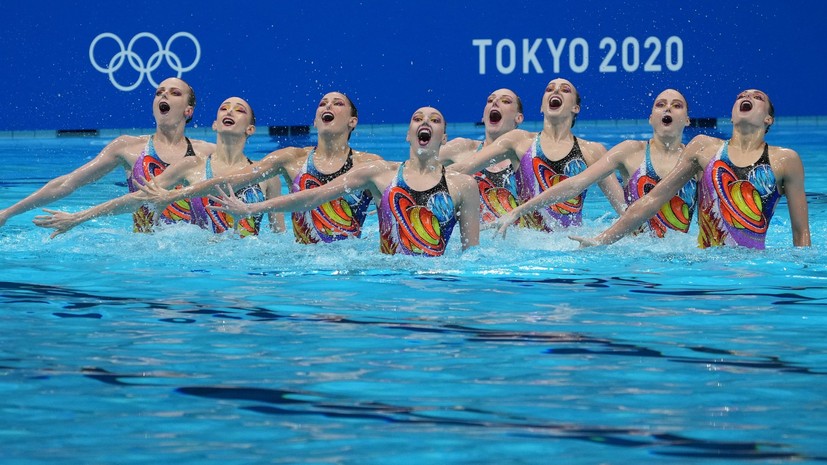Against the background of the Russian defeat in rhythmic gymnastics and the scandal that followed, the grandiose victory in synchronized swimming and the record of Svetlana Romashina, who won the seventh Olympic gold, went on somehow quite casually. Exactly as one of the Russian commentators put it on the air that defeat can be considered a sensation against the Russian team. And the victory - what kind of sensation is it? This is the most commonplace and norm. Duty result. Alas, it is really perceived by many that way.
Isn't it a paradox? Svetlana Kolesnichenko, Alla Shishkina and Aleksandra Patskevich, after Saturday's victory in the group, became three-time Olympic champions. Vlada Chigireva and Maria Shurochkina won the second gold in their careers, and Marina Golyadkina and Polina Komar opened an account of the Olympic awards. There is not a single component in which Russian athletes are not superior to the "rest of the world" by several orders of magnitude. And this tremendous success emotionally hardly affects the world.
Perhaps the whole point is that all superlatives are long over? Phenomenal? Yes. Amazing? Without a doubt. No other synchronous group in the world works as fast, harmoniously and high as Russia. Most coaches do not even risk putting athletes so close to each other in the most difficult combinations. As well as to take the prohibitive pace. But all this became clear not in Tokyo, but even when Russian athletes took the first two Olympic gold medals at the Games in Sydney. Since then, nothing new seems to have happened: all the listed qualities continue to be honed, and only the names of the champions change in the protocols.
Synchronized swimming and rhythmic gymnastics for so many years went on a parallel winning course, journalists found so much in common in the personalities of the two head coaches Tatyana Pokrovskaya and Irina Viner-Usmanova, in their methods of work and requirements for the result, that in Tokyo, at the time of the sixth Olympic triumph synchronized swimmers, latently continued to sit in consciousness: will Russian athletes ever have to endure an equally sudden blow that Russian rhythmic gymnastics experienced in Tokyo, having lost gold in individual all-around? And is it so by chance that Tatyana Pokrovskaya, whose wards in the world do not have and are not expected to be equal, is always desperately afraid that her girls may be imperfect in some way?
Tatiana Tarasova, an outstanding figure skating coach, expressed herself categorically about the results of the gymnastic final: "We are too tired of everyone with our victories, so they are trying to remove us from the champions by any means."
A similar phrase was repeated by the head coach of gymnasts-artists Irina Viner-Usmanova.
Probably yes: tired.
This version is at least on the surface.
Not a single international federation is interested in the fact that the same country won victories over the course of two decades.
In wrestling, in this case, the rules are revised, reducing the cost of techniques that the champion brilliantly owns, but those who are inferior to him do not possess.
In figure skating, during the times of the total superiority of Evgeni Plushenko, the cost of quadruple jumps was devalued in the same way, in gymnastics they also often do the same.
Analyzing the Saturday gymnastic finals, I happened to hear an interesting opinion from a person from this sport: they say, it is very likely that Russian gymnasts simply did not count some of the ligaments in the course of their combinations, they were not given the usual allowances.
Hence, they say, and the little-explained advantage that the Israeli athlete had after three types of the program.
Hence, a huge and completely unusual number of protests for a tournament of this rank: they say, we were not the only ones who did not understand what was happening behind the referees' consoles.
Is this option possible?
Do not know.
There is too little common sense in it: after all, in Tokyo, the final of the artists was preceded by a qualification, where the absurdity that began to happen afterwards was not even close.
Why did the judges suddenly change their priorities?
No one has yet given an answer to this question.
“If you get a good wife, you will be happy. If you come across a bad one, you will become a philosopher, ”says a well-known parable. Olympic defeats often lead to similar thoughts. From a philosophical point of view, a defeat in rhythmic gymnastics is quite capable of doing good to both synchronized swimming and many other sports. After all, it was it that very timely reminded the world how scanty the distance from a triumph to a sports tragedy can be.

